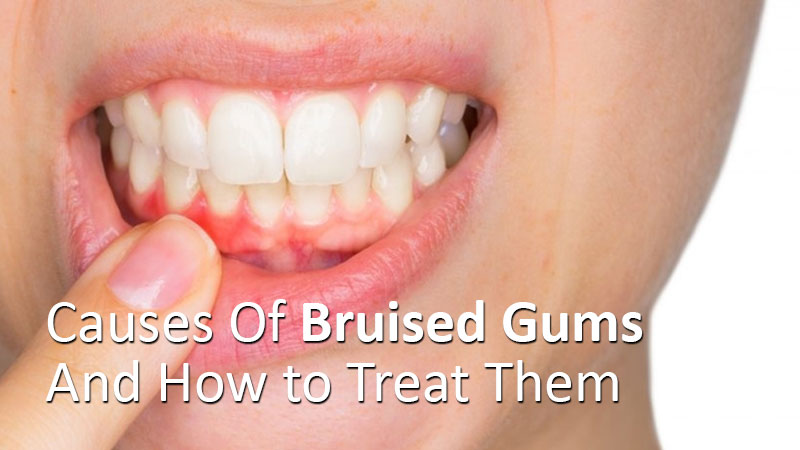
Bruises on the gums can vary in color; they might appear dark brown, black, red, or purple. There is also known to be pain and bleeding along with the bruising.
There are several causes for bruised gums. In most minor cases, the bruising can go away on its own.
If there is a health condition associated with the bruising or an injury that caused it, a healthcare provider can help diagnose and treat the issue.
This article discusses the causes, diagnosis, and treatment of bruised gums.
Causes of bruised gums:
1. Eating sharp objects:
Eating something sharp or crunchy, or poking your mouth with a sharp object, can also cause bruising to the gums. For example, biting into a crunchy chip, using a toothpick, or eating off a fork or skewer can all cause an accidental poke that leads to bruising and at times bleeding.
2. Trauma or injury to the mouth:
If there is trauma or injury to the mouth, the gums can bruise. If the mouth is hit, or there is an injury or fall, depending on the severity, bruising and swelling will develop and could be severe. It can also take some time to heal.
Along with bruised gums, other injuries can occur, such as broken or fractured bones, a dislocated jaw, or a cut inside the mouth or lip due to the trauma or injury.
If there is any injury or trauma to your mouth, contact a medical professional to get the proper diagnosis and treatment.
3. Flossing too hard:
It’s important to floss daily to prevent plaque buildup and decay in your teeth. There are different ways to floss, including using prethreaded flossers, water floss, and dental floss.
Dental floss is the most common, and there are times that the gums may be sensitive or a person may floss too hard against them. This can cause bleeding and bruising. In addition, the bleeding and bruising could be due to another medical condition.
4. Falling on your face:
Bruising of the gums can happen with a fall or an injury. Depending on the age of the person and the type of activity – whether it is sports-related, a fall from tripping, or due to weak bones – the fall on the face can cause bruising of the gums.
If you have fallen on your face and your gums are bruised, check other areas of your face and mouth to see if there is additional injury or bruising.
There could be a chipped tooth, as well as damage to the lips, jaw, or other areas of the face and mouth. Putting ice on the bruised area should help for minor injuries.
Treatment:
The treatment of swollen gums varies depending on the diagnosis and why they are swollen, including:
If it is minor bruising, it typically goes away on its own.5 A cold compress and eating softer foods will help. For babies who are teething, avoid hard foods. Other treatments include soothing the gums with a cool small spoon, moist gauze pad, or clean finger.
If thrombocytopenia is diagnosed, the doctor may order a blood transfusion to increase the platelets. The transfusion will happen if the platelet levels are extremely low. Normal levels are 150,000 platelets per microliter of blood.
The doctor may suggest surgery to remove the spleen. Another option is steroids such as immunoglobulins or antibody proteins along with other medications that are known to help stimulate platelet production and reduce the destruction of platelets.
Coping With Gum Pain
If you have gum pain, there are things you can do on your own to help reduce the pain, including:
- Avoiding eating crispy or sharp-edged foods
- Using a soft toothbrush
- Flossing gently
- Rinsing your mouth out with warm saltwater
If your gums are in pain, over-the-counter medications like Tylenol or Motrin can help. If the pain is severe, call your dentist or doctor so they can help you make the right decision about treatment options.
Frequently Asked Questions
What causes bruised gums?
Bruised gums can come from flossing, brushing your teeth too hard, a fall, an injury, or a hit to the mouth. Other causes include medical conditions such as gingivitis or thrombocytopenia.
What do bruised gums look like in babies?
When a baby’s gums are bruised, the colors are dark red, brown, bluish, purple, or translucent. At times, the bruising can be very noticeable when the tooth is growing in.
How long do bruised gums take to heal?
The healing time for bruised gums varies. It depends on the reason why the gums are bruised and if there is a medical condition involved.